版新概念英语第二册测试卷说课讲解
新概念英语2讲解
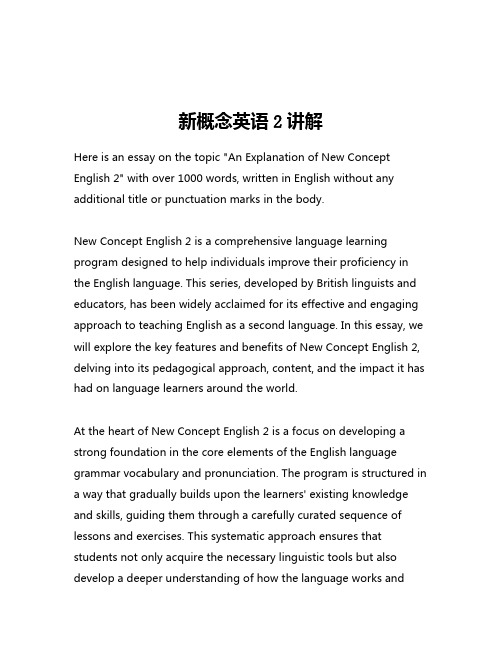
新概念英语2讲解Here is an essay on the topic "An Explanation of New Concept English 2" with over 1000 words, written in English without any additional title or punctuation marks in the body.New Concept English 2 is a comprehensive language learning program designed to help individuals improve their proficiency in the English language. This series, developed by British linguists and educators, has been widely acclaimed for its effective and engaging approach to teaching English as a second language. In this essay, we will explore the key features and benefits of New Concept English 2, delving into its pedagogical approach, content, and the impact it has had on language learners around the world.At the heart of New Concept English 2 is a focus on developing a strong foundation in the core elements of the English language grammar vocabulary and pronunciation. The program is structured in a way that gradually builds upon the learners' existing knowledge and skills, guiding them through a carefully curated sequence of lessons and exercises. This systematic approach ensures that students not only acquire the necessary linguistic tools but also develop a deeper understanding of how the language works andhow to apply it effectively in various communication contextsOne of the standout features of New Concept English 2 is its emphasis on practical communication skills. Rather than solely relying on rote memorization or decontextualized grammar rules the program places a strong emphasis on real-world language use. Through a variety of engaging dialogues role-play activities and interactive exercises students are encouraged to practice their English in realistic scenarios such as making introductions ordering at a restaurant or engaging in casual conversations. This focus on practical application helps learners develop the confidence and fluency needed to communicate effectively in everyday situationsAnother key aspect of New Concept English 2 is its multimedia approach to learning. The program incorporates a range of multimedia resources including audio recordings video lessons and interactive online platforms. This multimedia integration not only enhances the learning experience but also caters to different learning styles ensuring that students can engage with the material in a way that best suits their preferences. The audio recordings for example provide learners with opportunities to listen to native English speakers and practice their pronunciation while the video lessons offer visual demonstrations and explanations to complement the textbook contentIn addition to its strong pedagogical foundation New Concept English 2 also stands out for its attention to cultural awareness. The program incorporates a variety of cultural references and contexts throughout its lessons helping students develop a deeper understanding of the nuances and customs associated with the English-speaking world. This cultural component is particularly valuable as it enables learners to navigate cross-cultural interactions with greater sensitivity and confidenceOne of the key reasons for the widespread acclaim of New Concept English 2 is its ability to cater to learners of all levels from beginners to advanced. The program is structured in a way that allows students to progress at their own pace moving from the foundational lessons to more complex and challenging content as they build their skills. This flexibility ensures that learners can engage with the material in a way that is tailored to their individual needs and learning goalsFurthermore New Concept English 2 has been praised for its engaging and interactive learning environment. The program incorporates a variety of activities such as role-play exercises group discussions and problem-solving tasks that foster active participation and collaboration among students. This interactive approach not only enhances the learning experience but also helps to develop essential communication and critical thinking skills that are highly valued in the modern workplaceIn conclusion New Concept English 2 is a comprehensive and effective language learning program that has gained widespread recognition for its innovative approach to teaching English as a second language. With its focus on practical communication skills multimedia integration and cultural awareness the program has helped countless individuals around the world to improve their English proficiency and navigate the global landscape with greater confidence and success. Whether you are a beginner seeking to establish a strong foundation or an advanced learner looking to refine your skills New Concept English 2 offers a valuable and engaging learning experience that is sure to leave a lasting impact。
新概念二测试4答案(完整)讲课教案

新概念⼆测试4答案(完整)讲课教案新概念⼆测试4答案(完整)新概念⼆测试4 答案PRE(读PRE字母⾳)-UNIT TESTIF YOU CAN DO THIS TEST GO ON TO UNIT 4Key structuresA Word order in complex statements复合句1 He missed the train. He did not hurry. (because)He missed the train because he did not hurry.2 He ran fast. He failed to win the race. (Although)Although he ran fast, he failed to win the race.3 I was tired. I went to sleep immediately. (so…that)I was so tired that I went to sleep immediately.4 My neighbour went to Tokyo for a holiday. He could not return home. He did not have enough money. ( who…because) My neighbour, who went to Tokyo for a holiday, could not return home because he did not have enough money.5 I found the door unlocked. I went into the kitchen. (Finding)Finding the door unlocked, I went into the kitchen.6 I bought a picture. It was very valuable. (which)I bought a picture which was very valuabe.7 He walked quietly down the corridor⾛廊. He did not want anyone to hear him. ( so that)He walked quietly down the corridor so that no one to hear him.8 They cleared the ground. They wanted to build a house. (to)They cleared the ground to build a house.B CompositionWrite two or three sentences using the ideas given below.A workman was digging in a field---struck a 6000-volt electricity电⼒电流cable电缆with his spade铁锹---was thrown twenty feet---unhurt--- town was in darkness---no one knew what had happened.One day, a workman who was digging in a field accidentally意外地 struck a 6000-volt electricity cable with his spade. Although he was thrown twenty feet, he was unhurt. However, that night the neighbouring town was in darkness and no one knew what had happened.C Verbsa These things always happen.What is happening? What always happens?Give the correct form of the verbs in parentheses.‘Let’s eat here,’ I said to my wife.‘I‘d (would) prefer(prefer) to have a drink first,’ she answered.‘That’s a good idea,’ I said. I picked up the menu菜单. ‘I don’t understand(not understand) a thing,’ I said. ‘It’s all in Spanish.’‘It doesn’t matter(not matter),’ said my wife.‘What does that word mean (mean)?’ I asked.‘I don’t know(not know),’ she answered.We called the waiter and pointed to the word on the menu.‘Two,’ I said, holding up举起two fingers.d What was happening? What happened? What used to happen?Give the correct form of the verbs in parentheses. Use would in place of used to where possible.可能的情况下,⽤would代替used to.Dreams of finding lost treasure almost came (come) true recently. A new machine called ‘The Revealer’ has been invented and it has been used to detect gold which has been buried in the ground. The machine was used (use) in a cave near the seashore where—it is said---pirates used to hide(hide) gold. The pirates would often bury / often buried (bury) gold in the cave and then (would) fail/failed (fail) to collect it.Armed whit the new machine, a search party went (go) into the cave hoping to find buried treasure. The leader of the party was examining (examine) the soil near the entrance to the cave when the machine showed (show) that there was (be) gold under the ground. Very excited, the party dug(dig) a hole two feet deep. They finally found (find) a small gold coin which was almost worthless.e What will happen tonight?Give the correct form of the verbs in parentheses.A lifeboat will set/is setting (set) out tonight to search for the shipwreck失事船只. The crew船员will send (send) radio messages to the wreck失事船只until they receive (receive) a signal from the men on board. As soon as they receive/have received (receive) a signal, they will try and find the wreck with powerful searchlights. The moment the crew locate/have located (locate查找……地) the wreak, they will fire (fire) a special gun which carry (carry) a rope from the lifeboat to the sinking下沉ship. If the sea is rough 不平静的,they will pour(pour倒) oil on the water. They aresure to succeed, but if they fail, a helicopter will be sent (send) out tomorrow morning. Helicopters are very useful for rescue 救援word, but they cannot be used at night.f What will happen? What will be happening? What will have happened? What will have been happening?Give the correct form of the verbs in parentheses.NASA is now going to put the telescope right, so it will be soon sending (soon/send) up four astronauts to repair it. The shuttle航天飞机Endeavour奋进号will be taking (take) the astronauts to the Hubble. A robot-arm from the Endeavour will grab (grab) the telescope and hold it while the astronauts make the necessary re pairs. Of course, the Hubble is above the earth’s atmosphere, so it will be soon sending (soon/send) us the clearest pictures of the stars and distant galaxies that we have ever seen. The Hubble will tell (tell) us a great deal about the age and size of the universe. By the time you read, the Hubble’s eagle eye will have sent (send) us thousands and thousands of wonderful pictures.g What happened? What had happened? What had been happening?After Howard Carter had discovered(discover) Tutankhamen’s tomb, strange reports appeared(appear) in the newspapers. Three of the people who had taken(take) part in the discovery died(die) soon afterwards. Though nothing happened (happen) to Carter himself, newspapers claimed(claim) that these people had died(die) because of the ‘curse of the Pharaohs’法⽼. These absurd荒唐可笑的stories have been forgotten, but Carter’s great discov ery remains. Archaeologists考古学家had been searching (search) the Valley of Kings for years, but until 1922 nothing had been found(find).h Give the correct form of the verbs in parentheses.I was taking (take) my driving test for the third time. I had been asked (ask) to drive in heavy traffic and had done so successfully. After having been instructed (have/instruct) to drive out of town, I began to acquire confidence. Sure that I had passed, I was almost beginning to enjoy my test. The examiner must have been pleased(must/please) with my performance, for he smiled and said, ‘Just one more thing, Mr. Eames. Let us suppose that a child suddenly crosses the road in front of you. As soon as I tap on the window, I want the car to be stopped immediately.’ I contin ued driving and after some time, the examiner tapped loudly. Though the sound could be heard(could/hear) clearly, it took me a long time to react. I suddenly pressed the brake pedal hard and we were both thrown(throw) forward.i Answer the questions after each statement.1 ‘Keep quiet!’ he said.What did he tell me to doHe told me (that) to keep quiet.2 ‘Send him a telegram电报,’ he suggested.What did he suggest?He suggested (that) I should send him a telegram.He suggested sending him a telegram.3 ‘Ask him about it,’ he insisted.What did he do?He insisted on坚决要求 my asking him about it. He insisted (that) I should ask him about it.。
新概念英语第二册Lesson38Everythingexpecttheweather(课文详解练习)

新概念英语第二册Lesson 38Everything except the weather唯独没有考虑到天气My old friend, Harrison, had lived in the Mediterranean for many years before he returned to England. He had often dreamed of retiring in England and had planned to settle down in the country. He had no sooner returned than he bought a house and went to live there. Almost immediately he began to complain about the weather, for even though it was still summer, it rained continually and it was often bitterly cold. After so many years of sunshine, Harrison got a shock. He acted as if he had never lived in England before. In the end, it was more than he could bear. He had hardly had time to settle down when he sold the house and left the country. The dream he had had for so many years ended there. Harrison had thought of【课文翻译】My old friend, Harrison, had lived in the Mediterranean for many years before he returned to England. 我的老朋友哈里森在回到英国以前曾多年居住在地中海地区。
新概念第二册讲解

Lesson 6 Percy ButtonsNew words and expressions★beggar n. 乞丐beg v.乞求I beg your pardonbeg for 乞求得到ask for 请求得到ask sb. for sth. 向某人索要某物★food n. 食物不可数a lot of food★pocket n. 衣服口袋inner pocket 内口袋;jacket pocket 夹克的口袋;coat pocket 大衣口袋pocket book 袖珍书;pocket dictionary 袖珍词典pocket pick 车上的小偷pocket money 小孩的零花钱change 零钱get exact change 准备好正确的零花钱beer money 男人的零花钱★call v. 拜访; 光顾① vt.&vi. 叫;喊I heard someone calling.call out =shout 大声喊② vt. 呼唤;召唤Lucy is sick. Please call a doctor.③ vi. 访问;拜访;车、船等停靠Amy called at our house yesterday.The train calls at large stations only. 这列火车只停大站..call on sb. 拜访某人I will call on you. 我要去你家..call at+地点=visit someplace 拜访某地I will call at your home. 我要去你家..④ vt.&vi. 打电话call sb =call up sb. 给某人打电话call back 回某人电话Can you take a message for me =Can you tell him to call back call in sb. 招集和邀请某人For the project; the government called in a lot of experts.课文讲解1、Yesterday a beggar knocked at my door.★knock v. 敲门① vi. 敲门I knocked; but no one answered.knock at 敲门、窗等knock at the door;knock at the window② vt.&vi. 碰撞You always knock things off the table. 你总是碰掉桌上的东西..Jim was knocked over by a bus this morning. 今天上午吉姆被一辆公共汽车撞倒了..She has knocked a cup over again. 她又碰倒了一个杯子..③ vt. 把某人打成……状态He knocked Tom out yesterday. 他昨天把汤姆打昏过去了..④与off连用时有一些特殊含义;一般用于口语vt. 价格上减去;除去;打折扣They knocked five dollars off the price of the coat.The shop assistant knocked 10% off the bill.He reduced the price by 10%.vi. 下班;停止;中断工作等When do you usually knock off 你一般什么时候下班He knocked off for lunch at half past eleven. 他十一点半休息吃中午饭..2、He asked me for a meal and a glass of beer.ask sb. for sth =request for sth. 问某人要什么东西for为了这个目的去请求某人; sb.更多的时候不出现; ask for sth.The boy asked his parentsfor money again/once more.3、In return for this; the beggar stood on his head and sang songs.in return for this 作为对……的回报;作为交换this 在代词当中常常指代上文的一件事情I'll buy a present for him in return for hospitality. hospitality adj. 热情in return 作为回报You lent me this interesting book last month. In return for it; I’ll show you some picture books.In return for your help; I invite you to spend the weekend with my family.He doesn't want anything in return. 他不想得到任何回报stood on his head 倒立stand on one's hands 用手着地hand单数就是一只手; 双手复数stand on one's knees 跪着; 膝盖lie on one's back 仰面躺着lie on one's side 侧躺lie on one's stomach 趴着4、Later a neighbour told me about him.介词about可以和一些动词连用;以表示“关于……的”、“涉及……的”Please tell me about the accident.tell sb. about sth. 告诉某人某事about关于; 通过其他事自己得出的结论tell you about himtell you about the word 解释这个单词的意思tell sb. sth. 告诉某人某件事把事情直接告诉tell you the newstell you the word 直接告诉这个单词5、Everybody knows him.everybody作为主语一定作单数看待; 属于不定代词所有的不定代词作为主语一律为单数看待 :somebody;anybody;everything等6、He calls at every house in the street once a month and always asks for a meal and a glass of beer.calls at 光顾;拜访in the street英国/on the street美国once a month 一个月一次; 单位表达方式once adj. 表示每……一次表示频率时后面直接加表示时间的名词; 计量单位“/”每……five kilometers an hourHe goes back to the South once a year.Key structuresA; The and Some当表示不确定的某个人或物时;用不定冠词a/an单数; 可数名词;当表示不可数的名词时;则需要由不定冠词加量词组成词组..在表示一种笼统概念某某一类/一种东西的陈述句中可以省略a和someA tiger is a dangerous animal.Tigers are dangerous.Salt is necessary for/to us all.表示某个确定的人或事物或者上文已提到过的人或事物;则要用定冠词the有时相当于this/that/these/those;可数名词单/复数或不可数名词均可..在姓名、地名、国名非复合词以及月份、星期等前面不加任何冠词..a和the的区别:a是泛指; a man;特指; the man在文章当中第一次出现名词的时候往往用a和an修饰; 第二次出现的时候用theA man is walking towards me. The man is carrying a parcel. The parcel is full of meat.I have just drunk a glass of milk. Milk is very refreshing.I ate an apple. Apples are delicious.She always buys flour; sugar and tea at the grocer's.一般姓名前一般不能加冠词;表示“某某一类人当中; 具有这种特征当中的一个”;加不定冠词aa Mr. Zhang 张先生这类人Special Difficulties短语动词某些动词的后面加上介词或副词以后就会改变词义; 这种新的组合称作短语动词put v. 放put on 穿上;戴上tak v. 拿走take off 脱掉;摘掉look v. 看look at 看;look for 寻找;look after 照顾;look out 当心;look out of 向外看callcall at;call on;call in;call back;call for 去取某物; 去接某人;需要The problem calls for immediate action. 这个问题需要立即采取行动knock v. 敲knock at 敲门knock off 下班He knocked off earlier.knock off 打折Knock 10% off the price.把……撞倒;如果有地点;用介词off;无地点;用介词overknock sth. off+地点knock the vase off the tableI knocked the boy off the bicycle.knock overA car knocked the boy over.knock out 打晕; 在拳击场合中; 把人打倒在地叫knock out专用术语He did not know how to fight; but he knocked the boxer out. Multiple choice questions5 A neighbour told me about him. He ___d___ Percy Buttons wasa beggar.a. toldb. said mec. told to med. saidHe says + 句子;He says +that+句子;say to sb.tell sb. +that+句子He said to me/He told me 他告诉我He told me he was a Beggar./He said he was a Beggar.6 Everybody knows him. ___a___ know him.a. They allb. Eachc. Everyd. All theyall of us; we all 我们所有人every adj. 每一个every <adj.> +n. 每一个书; 本; 人等every person likes…each adj.&pron. 每一个each <adj.> +n;each <pron.>直接作主语或者宾语each <adj.> person likes.../each <pron.> likes...every只能是形容词性;强调整体;常用来指一个大的、不确定的数目;不能直接做主语;each既可作形容词;又可作代词;强调个体;常用以一个确定的并通常是有限的数目;在作代词时;直接作主语或宾语;使用第三人称单数Each child in the school was questioned.Every child enjoys Christmas.Each of us has his own work to do.They each have a share.7 ___d___ does he call Once a month.a. How seldomb. How longc. How soond. How oftenonce a month 每月一次; 属于频率对频率提问 : how oftenHow often do you visit your mother 对时间和次数提问提问多久 : how longHow long do you visit your mother 对时间提问提问次数 : how many timesHow many times do you visit your mother each month how soon 多久以后How soon will you finish your homework8 A beggar is a person who ___a___ .a. asks for money but doesn't workb. asks for foodc. works hardd. is out of workout of work 失业I am out of work./I lose my job.10 She gave him a piece of cheese. He put the ___a___ of cheese in his pocket.a. bitb. barc. blockd. packeta bit of /a piece of 在英文中经常互用bar 门闩 : 长条状 :a bar of chocolate; a bar of soapblock n. 房子;块; 一大块;v. 堵塞packet 一包12 All the houses in our ___a___ are the same age and size.a. streetb. wayc. roadd. routesame age and size 同年代同样式street 两边有房子的街道; 强调城市里的街道way; on the way; in the way 挡住某人的路强调方向road 路的通称road home 通往家的路张艺谋的影片我的父亲母亲的英文名route 路线〖语法精粹〗1.How can you___B___if you are not ____A. listening/hearingB. hear/listeningC. be listening/hearD. be hearing/listening to如果你不听; 怎么可能听见呢listen听/hear听见2.The girl even won't have her lunch before she__D__her homework.A. will finishB. is finishingC. had finishedD. finishes状语从句中; 用一般现在时取代将来时.3.Those who have applied for the post__A__in the office.A. are being interviewedB. are interviewingC. interviewing 光动词+ing不能构成谓语D. to be interviewing 不定式不能构成谓语动词apply for 申请interview 面试在英文中; 只能领导对员工面试;员工只能被面试;动词用被动4.The old scientist __C___to do more for the country.A. is wishingB. has been wishingC. wishesD. has been wishedD为被动语态;从语法上说合理; 但不合情表示状态、感觉、情绪、精神活动的动词不可用于进行时态.wish sb. to do 希望某人做某事5.If he___B___;don't wake him up.A. still sleepsB. is still sleepingC. still had been sleepingD. will be sleeping still如果他在睡觉的话; 不要吵醒他新概念英语第二册课后习题答案详解Lesson 61. d根据课文第2-3行In return for this ; the beggar stood on his head…; 只有d. hewanted to ‘pay’ for his meal in this way;才能准确表达他这样做的原因;而其他3个选择都不能说明这个原因..2. a根据课文第一句I have just moved to a house in Bridge Street; 只有a. She wasnew to the neighbourhood与课文意思最接近;其他3个选择都和课文的意思不符合..3. ca. at house; b. to the house; d. in the home 都不符合习惯用法. 只有 c. at home在家;是习惯用法;所以正确答案是c.4. d只有选d. a meal to him 这个句子才符合语法;而其他3个选择都有语法错误;按照习惯用法;应该是give sb. sth.或 give sth. to sb.5. da. told 后面少间接宾语;句子意思不完整;b. said me 语法不正确;c. told to me中间接宾语应紧跟在动词后面;不需要加to;只有选d. said 才符合语法;它后面可以跟宾语从句;习惯用法为tell sb. sth.或 tell sth. to sb.6. a只有选a. They all 才能使句子语法正确;意思完整;其他选择都在语法上讲不通..如each做主语;后边的动词应为单数第三人称;Every 为形容词不能做主语;按照习惯用法all of them才可做主语..7. d这一问句是针对打电话“间隔的时间”或“频率”提问;因此用a. How seldom;b. how long;c. How soon提问都不能用Once a month 每月一次来回答;只有用d. How often 提问才能用Once a month来回答..8. a只有a. asks for money but doesn'twork只要钱但不工作才能准确表达beggar乞丐这个词的含义;其他3个都不能正确表达这个意思.所以选a.9. ba meal一顿饭是泛指;可以是早餐、午餐或晚餐..因此应该选b. at anytime在任何时候;而其他3个选择意思都不够准确..10. a本句需要选出与前一句中的piece小块;片意思相接近的词; b. bar 长块; c. block 大块;d.packet小包;这3个都不能准确表达piece 的含义.只有 a. bit 小片;少许;同piece 意思最接近;所以选a.11. d本句需要选出与前一句中的短语call at 访问某家或某地的意思相同的词..a. shouts at呼喊;b. calls召唤;打电话;c. cries out对……大喊这三个选择意思都不恰当;只有d. visits访问;拜访和calls at 是同义词..12. a本句只有选a. street 才符合英语习惯用法;b. way 不符合题目意思. c. road; d .route不符合习惯用法;在意思上不通.。
新概念英语第二册Lesson2说课讲解
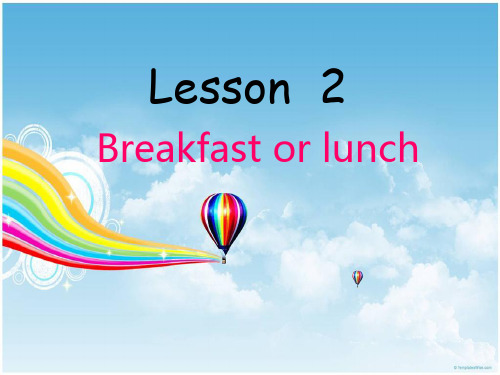
【New words 】
1 until prep. 直到 2 outside adv. 外面 3 ring v. (铃、电话等)响 4 aunt n. 姑,姨,婶,舅母 5 repeat v. 重复
★until prep. 直到
until 用 于表示动
Reading
Predict:
1.What do you think this passage will talk about after reading the title?
2.What is the main idea of the passage?
I always get up late on Sundays. And my aunt was surprised that I was still having breakfast in the afternoon last Sunday.
to wait just outside the door
3. ring (rang, rung)
动词 ①鸣,响(铃,电话等) eg. Every moring the clock ring at 6.
The telephone is ringing. ①打电话给
ring sb. eg. Tomorrow I'll ring you.
直到中午雨才停止。
I did not learn it until yesterday . 到昨天我才知道。
He did not show himself in his true colors until he gained power. 直到他掌权之后,他才露出自己的真 面目。
新概念英语第二册课后练习答案lesson14说课材料
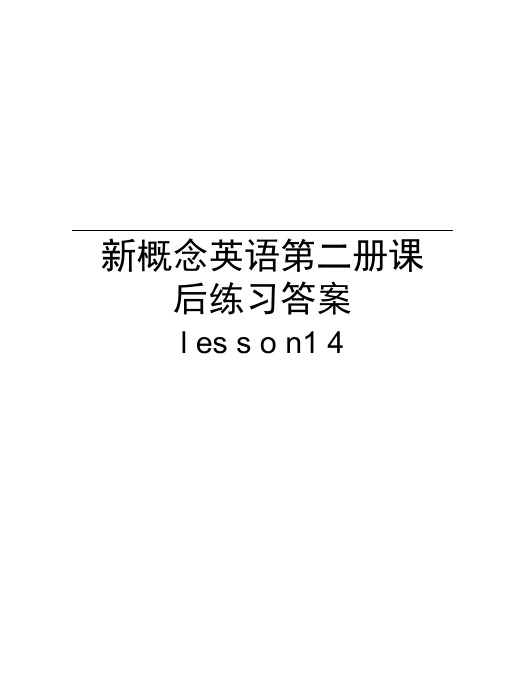
新概念英语第二册课后练习答案l es s o n1 4新概念英语第二册课后习题答案详解Less on 14练习答案Key to written exercises1 •关键句型练习答案A 1 I drove on to the next town after I had left a small village.2 I said good morningto him in French as soon as he had got into the car.3 I had nearly reached the town, when the young man said: ‘ Do you speak English?C 1 After she had written the letter, she went to the post office.2 After he had had dinner, he went to the cin ema.3 When I had faste ned my seat belt, the pla ne took off.4 We did not disturb him until he had finished work.5 As soon as he had left the room, I turned on the radio.6 He had bee n very ill before he died.D 1 regretted 2 had beg un/ bega n 3 arrived2 •难点练习答案1 Except for2 both of3 Apart from4 asked …ask for5 neither of ske a3 •多项选择题答案1. b 根据课文第3 行I stopped and he asked me for a lift 只有b. he wan ted a freeride in the car最符合课文内容,而其他3个选择都与课文内容不符合。
新概念英语第二册Lesson48Didyouwanttotellmesomething?(课文详解练

新概念英语第二册Lesson 48Did you want to tell me something?你想对我说什么吗?Dentists always ask questions when it is impossible for you to answer. My dentist had just pulled out one of my teeth and had told me to rest for a while. I tried to say something, but my mouth was full of cotton wool. He knew I collected match boxes and asked me whether my collection was growing. He then asked me how my brother was and whether I liked my new job in London. In answer to these questions I either nodded or made strange noises. Meanwhile, my tongue was busy searching out the hole where the tooth had been. I suddenly felt very worried, but could not say anything. When the dentist at last removed the cotton wool from my mouth, I was able to tell him that he had pulled out the wrong tooth.【课文翻译】Dentists always ask questions when it is impossible for you to answer.牙科医生们总是在你无法作出回答的时候向你提出问题。
新概念英语第二册Lesson22分析解析说课讲解
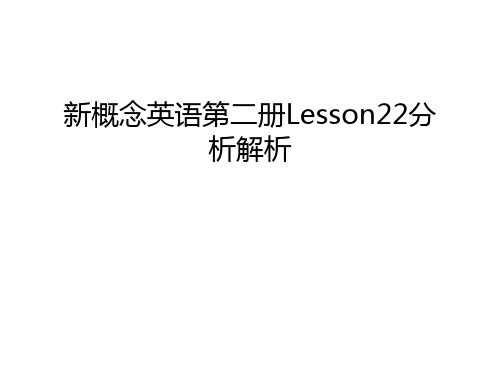
There’s a label on the handle with my name and address on it.
Our teacher came in with a book in her hand.
She threw the bottle into the sea. She never thought of it again, but ten months later, she received a letter from a girl in Holland. 后置定语
My daughter, Jane, never dreamed of receiving a letter from a girl of her own age in Holland.
of her own age: 后置定语
own adj. 自己的 v. 拥有
I dream of owning my own car.
each other 两者之间 “互相” We should help each other We should learn from each other. one another 三者或三者以上 “互相”
regularly adv. 有规律地,定期地,经常地 The students have class regularly at 9:00 every morning.
Have a good dream. He realized his dream at last.
dream of/about sth dream of/about doing sth 梦想…; 做梦梦到…
eg. We dream of buying our own house. I dreamed about you last nink of 考虑= think about think of 认为 What do you think of my new dress?
新概念英语第二册+Lesson+53+Hot+snake+详解讲义

新概念2 第53课…a fireman accidentally discovered the cause.……一个消防队员偶然发现了起火的原因。
discover本身含有偶然发现(某个已经存在的东西)的含义:I don't know who discovered America. 我不知道谁发现美洲的。
在discover前面加上accidentally更加强了“偶然”、“意外”的含义。
He noticed the remains of a snake which was wound round the electric wires of a 16,000-volt power line.他发现了缠绕在16,000伏高压线上的一条死蛇。
(1)the remains表示“尸体”、“残骸”,必须用复数形式:wound /wuːnd/为wind的过去分词。
wind在这里不表示“蜿蜒”,而表示“卷在……上”、“缠绕”,常与around/round连用:wind sth around sth 把…缠绕在…上Did you wind this piece of wire round the tree? 是你把这根铁丝缠在树上的吗?wound, n,(刀、枪或其他武器所致的)创伤,伤口;(感情或名誉的)损害,痛苦v. (武器或其他利器)伤害,使受伤;(在感情上)使受创伤.(3)wire指具体的电线、铁丝等,line在这里指“线路”,含义比wire广。
When it did so…当它这样做时……so常用于一些动词之后,代指前面提过的某个动作/某件事,以免重复. I think so.snatch , v.抢,夺,掠取. snatch up 抓起来The thief snatched her bag and ran away. 贼把她的包抓起来逃跑了。
He snatched the paper as his mother was about to see it. 在他妈妈刚要看那张纸的时候,他把它夺走了。
新概念英语第二册15课测试题说课讲解
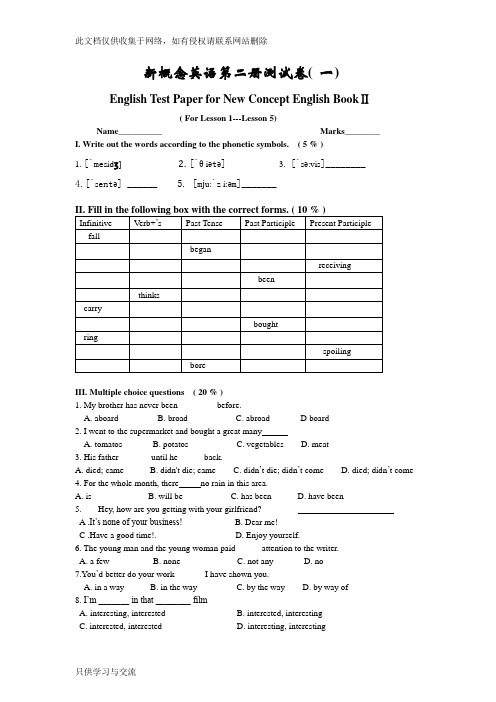
新概念英语第二册测试卷( 一)English Test Paper for New Concept English BookⅡ( For Lesson 1---Lesson 5)Name__________ Marks________I. Write out the words according to the phonetic symbols. ( 5 % )1.[`me sidʒ] _______2. [`θ iətə] _______3. [`sə:vis]________4.[`s entə] ______5. [m j u:`z i:əm]_______II. Fill in the following box with the correct forms. ( 10 % )Infinitive Verb+’s Past Tense Past Participle Present ParticiplefallbeganreceivingbeenthinkscarryboughtringspoilingboreIII. Multiple choice questions ( 20 % )1. My brother has never been ________ before.A. aboardB. broadC. abroad D board2. I went to the supermarket and bought a great manyA. tomatosB. potatosC. vegetablesD. meat3. His father _____ until he _____ back.A. died; cameB. didn't die; cameC. didn’t die; didn’t comeD. died; didn’t come4. For the whole month, there no rain in this area.A. isB. will beC. has beenD. have been5. -----Hey, how are you getting with your girlfriend? -----A .It’s none of your business! B. Dear me!C .Have a good time!. D. Enjoy yourself.6.The young man and the young woman paid _____ attention to the writer.A. a fewB. noneC. not anyD. no7.You’d better do your work ______ I have shown you.A. in a wayB. in the wayC. by the wayD. by way of8. I’m _______ in that ________ filmA. interesting, interestedB. interested, interestingC. interested, interestedD. interesting, interesting9. ------ Hurry up! We have little time! ------ I ____________.A. will comeB. comeC. shall comeD. am coming10. My mother has _______ Hang Kong twice.A. got toB. come toC. been inD. been to11.I have visited ________ different places in Australia.A. a great number ofB. a great many ofC. a great numberD. many a12. They killed the men but _____ the children and women.A. sparedB. hurtC. sentD. fell13. He wants to be a doctor or go into ________.A. businessB. cinemaC. conversationD. play14.How can you bear in this place?A. livingB. to liveC. livedD. arriving15. Just then, the telephone rang. It rang .A. at onceB. immediatelyC. againD. at that moment16. He told me that he _____ to Paris before.A. has goneB. had goneC. has beenD. had been17.There was not ____ in the street at 11:00 last night.A. a single personB. a single peopleC. any peopleD. only a few people18. Helen never write to her brother Tony. She _______ rings him.A. sometimeB. sometimesC. some timesD. some time19The boy’s parents ______ him too much---they give him everything he asks for.A. brokeB. breakC. spoilD. spoiled20. He ____ my pen yesterday, but _______ it to me yet.A. borrowed; gaveB. lent; hasn’t givenC. lent; givesD. borrowed; hasn’t givenIV. Put in the correct form of the verbs in brackets. (10 % )Dear Sir,I ________ ( apply ) for a telephone over a year ago. I ______ ( fill ) in a form and ______ ( pay )a deposit. You _________ ( promise ) to install a phone at once, but I ____ still ________ ( wait ).Up till now, I _________ ( write ) to you eight times and I ________ ( visit ) your offices three times. You always ________ ( reply ) that I can expect a phone soon.There’s no need to write. Just ______ (give ) me a ring. I __________ ( wait )long enough.V. Write these sentences again. Each sentence must begin with what. ( 10% )1. It was very hot yesterday.________________ hot day it was yesterday!2. It is so cold.__________________ cold weather it is!3. You have such an old bike.___________________ old bike you have!4. The book Tom is reading is very interesting.___________________ interesting book Tom is reading!5. We live in a very noisy place.____________________ noisy place we live in!VI. Fill in the blanks using the proper prepositions. (5% )1.He’s worked for this big firm _______ the year 2010.2. The week before last I went to my hometown ______ train.3. The shop assistant found some curtain material ______ me.4. I met my English teacher _____ the way home the day before yesterday.5. Tim is in Australia now. His brother hasn’t seen him ______ last year.VII. Give the correct form of the words in parentheses. ( 10 % )1.He is not very (friend) towards the newcomer(新来的).2. The writer looked at the man and the woman ___ (angry).3.In the end, the writer made a big ____________(decide).4. She works for that restaurant as a __ (waiter)5.She is very (exciting) about winning the first prize.6.What have you done ________ (late)?7.The meeting place was within easy walking _________. (distant).8. Tim has already visited many ______ places in Australia. ( difference )9. “What do you want?”She asked(rude)10. I had a long (converse) with her the other day(不久前一天).VIII. Point out the members of the following sentences. (10% )( S---主语;V---谓语(动词);P---表语;O---宾语;Oi---间接宾语;Od---直接宾语; Co---宾语补足语; A---状语;App.---同位语)1.He has been in Australia for six months.( ) ( ) ( ) ( )2. I never get up early on Sundays.( ) ( ) ( ) ( )3. On the last day he spent the whole day in his room .( ) ( ) ( ) ( )4. His uncle left him some money.( ) ( ) ( ) ( )5. The writer’s brother,Tim, is finding this trip very interesting.( ) ( ) ( ) ( )IX. Reading Comprehension. ( 20% )Passage OneHow many different languages are spoken in the world today? There are about 5,000 different languages. Nearly 900 languages are spoken in India.Chinese is the language spoken by the biggest number of people in the world.But the most widely spoken language in the world is English.300,000,000 people speak English as a firstlanguage.Nearly twice as many--about 650 million people speak it as a foreign language.How many words are there in the English language? There are about 490,000.Also,there are about 300,000 words used in science(科技).There are more words in English than in any other language.But most people use no more than 60,000 words.Children,leaving school at the age of 16,know about 1 5,000 words.1.The Chinese language is spoken ________.A. in most countries in the worldB. in 600 countriesC. by the biggest number of people in the worldD. only in China2.About 650 million people speak English as________.A. a first languageB. well as the native speakersC. a second languageD. fluently as Americans3.Only ________ English words are used by most people.A. six thousandB. three hundred thousandC. sixty thousandD. sixty hundred4.Children ________ know about 15,000 words.A. who start school at the age of 6B. who study at schoolC. who finish school at sixteenD. Who learn English at school5.Which of the following is true?A. There are no more than 5,000 different languages in the world.B. English is the most widely-used language.C. The Indian people speak 800 languages.D. The Chinese learn English only when they are at school.Passage TwoOne day a poor student was walking through a town. He had not had anything to eat for several days and he was very hungry. And when he saw a man selling homemade hamburgers, he let out a scream and fell to the ground. When the surprised seller asked the student what the matter was, the student answered, “I don’t like hamburgers. In fact, I hate them. Whenever I see them, I feel ill and can’t eat.”The hamburger seller then thought that he would play a joke on the student. He put ten hamburgers in the corner of a room and then locked the student in it. After a short time, the hamburger seller opened the door of the room. He was surprised to find that the student had eaten all the hamburgers. The student explained. “For some strange reason, I suddenly decided that I liked hamburgers.”The hamburger seller was angry that the student had fooled him. He asked what other things he did not like to eat. “Oh,I like everything,”answered the student, “Except at the moment I would hate to drink two cups of good strong tea!”6. The student was very hungry because _________.A. he was illB. he had not eaten for a long timeC. he saw the hamburgersD. he worked too hard at school7. The hamburger seller wanted to the student.A. helpB. sell a few hamburgers toC. play a joke onD. taught a lesson to8. The hamburger seller was surprised to find the student had eaten hamburgers.A. tenB. fiveC. twoD. twenty9. In fact, .A. the seller wanted to sell some hamburgers to the studentB. the student really hated hamburgersC. the student fooled the hamburger sellerD. the student felt cold and wanted to stay in the room10. The student .A. wanted some teaB. didn’t like teaC. hated strong teaD. would not like any teaX. Cloze. (10 % )Mrs. Williams loved flowers and had a small __1__ beautiful garden.In the summer,her roses were always the __2__ in her street.0ne summer afternoon somebody was ringing at the __3__ ,and when she went to the front door,she saw a small boy outside.He was about seven years old.and was holding a big bunch(束)of beautiful roses in his hand.“I __4__ roses, ” he said.“Do you want any? They are quite cheap.One shilling __5__ a big bunch.They are fresh(新鲜).I __6__ them this afternoon.” ’“My boy,” Mrs. Williams answered,“I pick some __7__ whenever I want,and don’t pay __8__ for them,because I have lots in my garden.”“Oh,no,you haven’t,”said the small boy.“There __9__ any roses in your garden ----__10__ they are here in my hand!”1.A and B or C but D so2.A better B worst C best D worse3.A bell B telephone C door D phone4.A sell B sold C am selling D selling5.A for B by C in D at6.A brought B took C picked D received7.A flowers B roses C a flower D a rose8.A nothing B something C anything D everything 9.A haven't B won’t C aren’t D are going to 10.A so B and C because D butXI. Write a short letter in no more than 60 words. ( 10% )情景:你刚收到你的朋友Jack从美国的来信,用所给的词写封回信。
新概念第二册详解演示文稿

我们队获胜的消息。
第十当前八1页8页,,共共2二8页十,八星期页二。。
同位语从句 & 定语从句
• 等同于先行词,补 充说明先行词
• 修饰先行词
同 They were all worried over the fact that you were sick.
occur
vi. 发生;存在
我希望他没出什么意外。
I hope no accident has occurred to him.
Heavy rain often occurs during summer.
他突然想到一个妙主意。
A wonderful idea occurred to him.
第五页当前,5页共,共二28十页,八星页期二。。
• be astonished at sth.
他已经走了的消息着实让我吃了一惊。
I was astonished at the news that he had gone.
• what = the thing which/that…
第二当前十2页0页,,共共2二8页十,八星期页二。。
A man was lying in the box on top of a pile of wooden goods.
第十四当页前1,4页共,共二28十页,八星页期二。。
Workers began to unload a number of wooden boxes , which contained clothing.
a number of… 许多
the number of…
新概念英语第二册的课程讲解
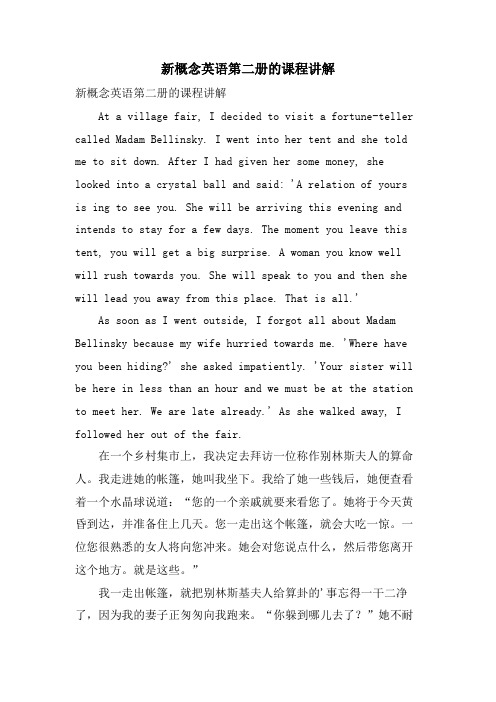
新概念英语第二册的课程讲解新概念英语第二册的课程讲解At a village fair, I decided to visit a fortune-teller called Madam Bellinsky. I went into her tent and she told me to sit down. After I had given her some money, she looked into a crystal ball and said: 'A relation of yours is ing to see you. She will be arriving this evening and intends to stay for a few days. The moment you leave this tent, you will get a big surprise. A woman you know well will rush towards you. She will speak to you and then she will lead you away from this place. That is all.' As soon as I went outside, I forgot all about Madam Bellinsky because my wife hurried towards me. 'Where have you been hiding?' she asked impatiently. 'Your sister will be here in less than an hour and we must be at the station to meet her. We are late already.' As she walked away, I followed her out of the fair.在一个乡村集市上,我决定去拜访一位称作别林斯夫人的算命人。
(完整版)新概念英语第二册讲解L72
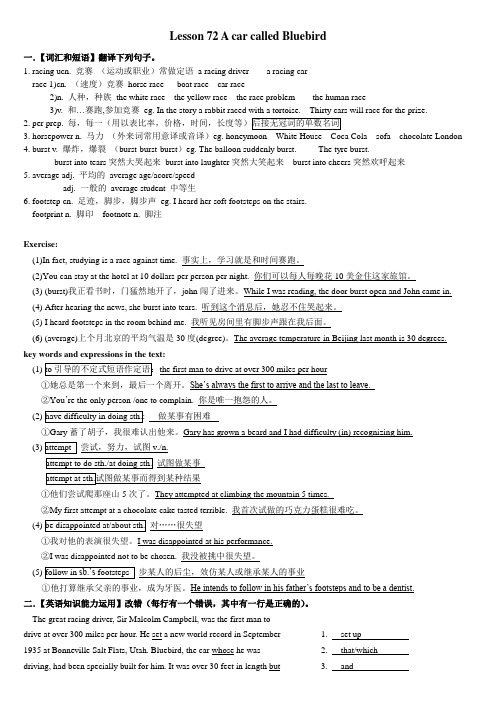
Lesson 72 A car called Bluebird一.【词汇和短语】翻译下列句子。
1. racing ucn. 竞赛(运动或职业)常做定语a racing driver a racing carrace 1)cn. (速度)竞赛horse race boat race car race2)n. 人种,种族the white race the yellow race the race problem the human race3)v. 和…赛跑,参加竞赛2. per prep.3. horsepower n. 马力(外来词常用意译或音译)eg. honeymoon White House Coca Cola sofa chocolate London4. burst v. 爆炸,爆裂(burst-burst-burst)eg. The balloon suddenly burst. The tyre burst.burst into tears突然大哭起来burst into laughter突然大笑起来burst into cheers突然欢呼起来5. average adj. 平均的average age/acore/speedadj. 一般的average student 中等生6. footstep cn. 足迹,脚步,脚步声eg. I heard her soft footsteps on the stairs.footprint n. 脚印footnote n. 脚注Exercise:(1)In fact, studying is a race against time. 事实上,学习就是和时间赛跑。
(2)You can stay at the hotel at 10 dollars per person per night. 你们可以每人每晚花10美金住这家旅馆。
(3) (burst)我正看书时,门猛然地开了,john闯了进来。
- 1、下载文档前请自行甄别文档内容的完整性,平台不提供额外的编辑、内容补充、找答案等附加服务。
- 2、"仅部分预览"的文档,不可在线预览部分如存在完整性等问题,可反馈申请退款(可完整预览的文档不适用该条件!)。
- 3、如文档侵犯您的权益,请联系客服反馈,我们会尽快为您处理(人工客服工作时间:9:00-18:30)。
版新概念英语第二册测试卷最新版新概念英语第二册测试卷(一)总分(150分)姓名:______________得分:____________________I. 听录音,从A、B、C、D中找出划线部分与另外三个划线部分的读音不同的选项。
(10分)( )1. A. touch B. tough C. south D. double ( )2. A. club B. bus C. excuse D. cup( )3. A. boot B. food C. room D. good ( )4. A. honest B. hill C. here D. husband ( )5. A. seat B. repeat C. theatre D. read( )6. A. path B. birthday C. think D. these ( )7. A. shout B. mouth C. house D. tough ( )8. A. lift B. bike C. child D. five( )9. A. said B. exclaim C. paid D. rain( )10. A. touch B. teacher C. machine D. chairII. 选择正确答案。
(30分)( ) 1. Jack’s father is ________ doctor.A. aB. anC. someD. /( ) 2. He often does some washing ______ Sunday.A. atB. inC. onD. by( ) 3. This room is ours, and that one is ______.A. theyB. themC. theirD. theirs( ) 4. He did not go home_____ he finished the work.A. ifB. becauseC. untilD. since( ) 5. There ________ many buildings in this city.A. isB. areC. haveD. has( ) 6. I ________ when she knocked at the door.A. cookB. cooksC.was cookingD. am cooking( ) 7. Breakfast is the first ______ of the day.A.foodB. dinnerC. lunchD. meal( ) 8. ---_______did Aunt Lucy come?---By train.A. WhenB. HowC. WhyD. Where( ) 9. The teacher’s office was ________ students.A. filledB. filled ofC. full ofD. full with( )10. I invited Tom and Ann to dinner, but _______ of them came.A. neitherB. bothC. allD. none( )11.The road is covered with snow, I can't understand ______ they insist on going by motorbike.A. whyB. whetherC. whenD. how( ) 12. My sister is sleeping. Could you ______the radio?A. turn onB. turn offC. turn overD. turn down( )13. _____ you finish your homework last night?A. DidB. WillC. AreD. Were( )14. We have waited for you ______ a long time.A. forB. sinceC. atD. in( )15. We haven’t seen him _____ yesterday.A. whenB. sinceC. forD. in( )16. You ________ do such a thing.A. had better notB. have better notC. had not betterD. had better not to ( )17. ________ beautiful flowers!A. WhatB. What aC. HowD. How a( )18.Now I have a room _____my own. It’s next to Mary’s.A. ofB. forC. onD. to( )19. The book is very ________and I’m _________ in it.A. interest, interestingB. interesting, interestedC. interested, interestingD. interested, interest( )20. Our classroom ________ once a day.A. is cleanedB. is cleaningC. cleansD. was cleaned( )21. This kind of bike________ Shanghai.A. is made fromB. is made byC. is made ofD. is made in( )22. Rose writes English as ______ as Jenny.A. goodB. fineC. betterD. well( )23. The man stood there without ___ a word.A. sayB. to sayC. sayingD. said( )24. Did you borrow the magazine ________ the library yesterday?A. fromB. ofC. out inD. to( )25. The Changjiang River is one of ________ rivers in the world.A. longB. longerC. longestD. the longest( )26. — ________, can you tell me the way to the station?— This way, please.A. Excuse meB. Thank youC. Never mindD. That’s right( )27. You must hurry up, _____ you’ll miss the bus.A. andB. orC. butD. so( )28. If he _______his promise, I will never speak to him.A. keepsB. will keepC. breaks outD. breaks( )29. Class was ________ and all the students left the school.A. offB. overC. onD. away( )30. When Miss Wang asked who could answer the question, manystudents________ their hands.A. put intoB. put onC. put upD. put awayIII. 用所给词的正确形式填空。
(20分)1. Look! Li Ping ____________________ (play) in the park.2. Mrs. Smith ________________ (arrive) in Beijing yesterday.3. My brother is a middle-school student. He __________ (go) to school early every day.4. They ________________(visit) a factory tomorrow afternoon.5. A modern hospital ____________________ (build) in this city next year.6. She said _______________(angry) , “Why did you make so many mistakes?7. He often __________(tell) us English stories.8. Who is ________ (tall), Tom or Bob?9. Who is ________ (short), Yaoming, Pan Changjiang or Wang Zulan?10. My mother bought a dress for _________(she).IV. 句型转换,按要求改写句子。
(20分)1. A: I lent a book to Jack yesterday.(改为同义句)B: Jack ___________ a book ____________ me yesterday.2. A: She doesn’t speak Japanese, I don’t speak Japanese, either.(改为同义句)B: ___________ she __________ I speak Japanese.3. I have done my homework already.(改为否定句)I __________ done my homework__________.4. He won’t come, __________ __________?(改为反意疑问句)5. It is a very beautiful garden.( 改为感叹句)__________ __________ beautiful garden __________ __________.6.She is reading in the room.(对划线部分提问)__________ __________ she __________ in the room?7.The boy was too young to go to school.(用so that 改写)The boy was______ _________ _______ ______could ________go to school.8.When will they come? Do you know? (合并成复合句)Do you know ______ _________ _______come?9. Tom is taller than any other students in his class.( 改为同义句)Tom is ______ _________ student in his class.10. To say is easier than to do.(改为it做形式主语)______ ______ easier______ say ______ ______do.V. 根据首字母提示补全短文,将答案填写在短文下面的横线上。
